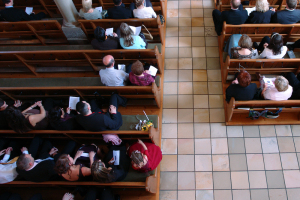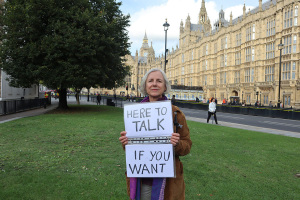Russell Moore: End of Cultural Christianity in America Is Opportunity for Church to Recover the Cross
WASHINGTON – Southern Baptist theologian Russell Moore challenged his fellow Christians to recover the Church's prophetic voice by first transforming the Church from the inside to reflect the hope of the kingdom of God to the world, and to not lose sight of the Cross as their central mission. Moore was delivering his inauguration speech Tuesday as the new president of the Ethics and Religious Liberty Commission, the public policy arm of the Southern Baptist Convention.
Early in his speech, Moore signaled that his approach to political engagement would be different than a previous generation of Christian political activism.
"We can no longer pretend we are a moral majority in this country," he said in reference to the early Christian Right organization founded by Jerry Falwell. "We are a prophetic minority who must speak into a world that is not different than any other era of this world's history, but is exactly what Jesus promised us the world must be."
There would be three aspects, Moore continued, to the ministry of the ERLC under his guidance: kingdom, culture and mission.
While Jesus brought judgement to the kingdoms of this world, Moore said, he also brought hope with news of the kingdom of God. And like Jesus, Christians should also bring news of that kingdom with optimism and without fear.
"As we march forward into the days that are before us," he taught, "the worst thing we can possibly do in changing times is to come with a sour and dour and gloomy pessimism about the culture around us. We cannot stand and speak, 'you kids get off my lawn.'"
Taking the long view, though, Moore does not believe that Christians are losing the so-called culture war. In a reference to the best selling 2003 book by Judge Robert Bork, Moore argued that "We are not 'slouching towards Gomorrah,' we are marching to Zion."
Speaking at Capitol Hill Baptist Church in Washington, D.C., Moore noted that those in politics tend to focus on the short term – political cycles and the next election. Christians, though, are "called to be the kind of faithful witness that is focused on the next trillion years."
Moore also believes that the Church in America will be better off when Christianity is no longer expected to be the default religion for cultural reasons, when Americans who have not decided to follow Christ as their Lord and Savior no longer call themselves Christian because that is simply what is expected of them, and when the Church is no longer considered synonymous with the Bible Belt.
"The Bible Belt is collapsing," he declared. "The world of nominal, cultural Christianity that took the American dream and added Jesus to it in order to say, 'you can have everything you ever wanted and Heaven too,' is soon to be gone. Good riddance.
"Instead we have the opportunity now to move away from the stale, old cultural nominalism that we have had for too long. We have an opportunity to move away from the liberation theologies of the right and the left that say to us, 'give us Barabbas and let him be crucified.' And we have instead an opportunity to be the Church of Jesus Christ."
To effectively engage the culture, Moore continued, Christians must recognize and correct their own sins.
"Brothers and sisters ... as sinners we are the people Jesus warned us about," he said.
Moore's voice slowed and became more emphatic as he discussed the sins of the Southern Baptist Church, which split from a larger denomination in defense of slavery prior to the Civil War.
"The fact that we were founded, at least partly, to justify man-stealing, kidnapping and lynching – we stand here only by God's grace and mercy."
Too many churches in America, he continued, are "slow-motion sexual revolutionaries," because they adopt cultural norms about a generation later.
"We believe now what the Woodstock generation believed about divorce. We believe now what a previous generation believed about fornication and cohabitation. And even now as we speak on issues of sexual ethics, the redline that we set keeps moving further and further and further and further down. That cannot stand. ... If we are going to be a voice that speaks to the outside world, we must first be transformed as that colony of the Kingdom from the inside."
Influencing the culture, he said, cannot be measured by legislative scorecards, but when congregations begin to look "freakishly strange" to those outside the Church: "Congregations that don't simply vote pro-life, although they do, but congregations that welcome and delight in the Down syndrome child in that congregation. ... Because this Down syndrome child is a heir of the Kingdom and a future ruler of the universe."
The central mission of the Church, though, should not be to speak about ethics to the larger culture, Moore believes, it should be the Cross – that a world of sinners has been redeemed by Jesus' death and those who accept his invitation have a new life.
"We cannot be longing for Mayberry," Moore claimed. "We must have a voice that speaks to the conscience, a voice that is splattered with blood. We are ministers ... not of condemnation, the devil can do that, we are ministers of reconciliation, which means that we will speak hard words ... truthful words to address the conscience, even when that costs us everything.
"But we will never end there. We will always end with the Word ... the invitation – if anyone who is in Christ he is a new creation. ... Our voice must not only be a voice of morality, it must also be a voice of welcome."
Moore also encouraged his fellow Christians to speak with "convictional kindness" to those they disagree with, "not because we are weak but because the Gospel is strong."
"The Kingdom of God is not made up of the moral," he continued. "The Kingdom of God is made up of the crucified and our mission is to speak to a world of people who are often going to come to the end of that mess of pottage that is the sexual revolution, that is pursuit of self, and will ask, 'what else is there?' The final word that we must have for those repented souls who throw themselves upon Christ after an abortion, after murder, after family dissolution, should be, there is, therefore, now no condemnation for those who are in Christ."
Other speakers at the inauguration included: Fred Luter, president of the Southern Baptist Convention, Congressman James Lankford (R-Okla.), former Congressman Gene Taylor (D-Miss.) (who Moore once worked with before he became a theologian), Robert P. George, McCormick Professor of Jurisprudence at Princeton, and the former head of the ERLC, Dr. Richard Land, president of Southern Evangelical Seminary. Around 200, mostly Southern Baptist pastors, were in attendance.





























